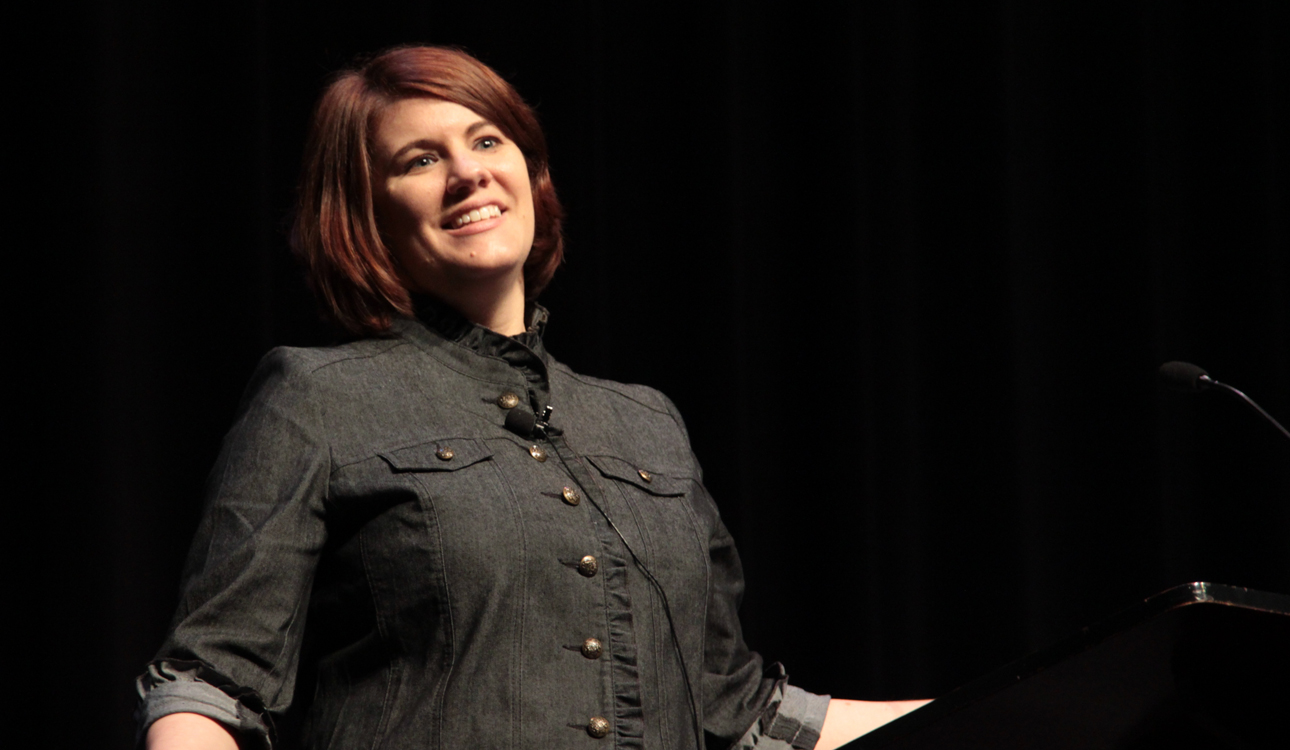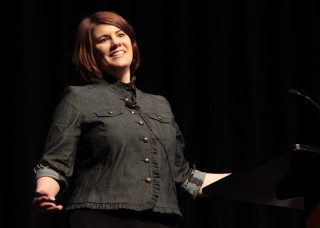

David Li | Lariat Photographer
By Meghan Hendrickson
Reporter
Rachel Held Evans, author of the recently published “A Year of Biblical Womanhood,” spoke at Chapel on Monday about her year-long project to discover how to live the life of a “biblical woman” according to laws set forth in Scripture.
After extensive study of the Bible and commentaries, Evans found every scriptural reference to women and applied it to her life in a literal fashion for one year.
This meant Evans submitted to her husband, grew out her hair, refrained from gossip, covered her head during prayer, called her husband “master” and camped out in her yard for the 12 days surrounding her menstrual cycle.
Evans observed some practices for the entire year; others she tried just once, such as the menstrual-cycle camp-out. Evans said during those 12 days of camping out, she and her husband attended a wedding, which she said was extremely awkward, since she could not engage in any physical contact with any man because, according to the Bible, she was considered “unclean.”
Evans said the topic of biblical womanhood always intrigued her for two reasons.
“First, if you ask Christians what ‘biblical womanhood’ means, you’ll always get different answers,” Evans said. “Also, any claim to a biblical lifestyle, specifically womanhood, is inherently selective.”
Evans wondered aloud whether there was only one “right way” to be a woman of faith.
She said she found the old-fashioned definition of biblical womanhood revolved around domesticity, motherhood and submission to male leadership both in the home and in the church. Evans said women of the 1950s were given the idea that if they did not excel at such things, they were not “biblical women.”
Evans referenced Proverbs 31 as a passage of Scripture that describes the ideal woman of faith. But she admitted to once having hated the passage because she thought it caused Christian women to feel inferior to the “Proverbs 31 woman.”
After her “year of biblical womanhood,” Evans concluded that Christians have been mistranslating the passage.
She said she realized Proverbs 31 is a poem about a woman of valor that should be used to encourage women, not condemn them.
“It’s not a to-do list for women, but instructions for men to remember what their wives have already done,” Evans said. Evans’ view of Proverbs 31 is not the only view that has been shared at Baylor.
St. Louis, Mo., freshman Alex Eklund started a discussion about the passage of Scripture after updating his Facebook status following the 2011 Victoria’s Secret Fashion Show.
“I’d rather have a Proverbs 31 woman than a Victoria’s Secret model,” he wrote.
Eklund, founder of the movement now known as LIVE31, spoke with Evans Monday about her perspective and said he found it “particularly refreshing.”
Eklund said Proverbs 31 has been misinterpreted and stretched to mean many different things in today’s culture, but that ultimately, LIVE31 and Evans are seeking the same goal.
“Our movement was always clear that we are not about domesticity or gender roles, but instead we are about discovering and empowering self-image through Christ, aided by the encouraging account of Proverbs 31,” Eklund said.
LIVE31 has invited Evans to write a guest blog post for its website.
Jared Slack, coordinator for Chapel and worship, said Evans did a wonderful job of addressing Proverbs 31.
In view of the LIVE31 movement started at Baylor and other similar writings and movements, Slack said he is alarmed to find the conversation surrounding the passage is still “male-centric.”
Slack said this means the Proverbs 31 woman is often defined by what a man desires in a woman and that a woman is an object of a man’s affection.
“It [the Proverbs 31 dialogue] is the same old cycle of women being encouraged to fit into a mold handed to them, rather than the freedom of God’s grace and love which leads us gently into lives of courage,” Slack said.
“What I hope for women on our campus is that they hear this loud and clear: You are objects and recipients of God’s unending affection,” he said.
Evans said one of the issues she discovered during her year of discovering biblical womanhood is a lot of people are approaching the Bible with an expectation for it to deliver what it does not deliver, which is a blueprint for living.
“I can find no blueprint in the Bible for ‘how to be a woman’ or ‘how to be a person of faith,’” Evans said.
“We can be disheartened by this, or we can trust that God had a reason for not giving us a blueprint,” she said
Evans discussed women from the Bible such as Ruth, Sarah, Martha and Mary Magdalene and said these women do not fit a single blueprint.
Evans said after her year long project, she came to the conclusion that faith is about living with valor being brave and unique.
“Faith is not about having everything figured out ahead of time, but living in valor without having it all figured out ahead of time,” Evans said. “Faith is about following Jesus.”
Evans said to live a life of faith, one must refer to Matthew 22:37-39, in which Jesus said the most important command is to “love the Lord your God with all your heart, all your soul and all your mind” and to “love your neighbor as yourself.”





